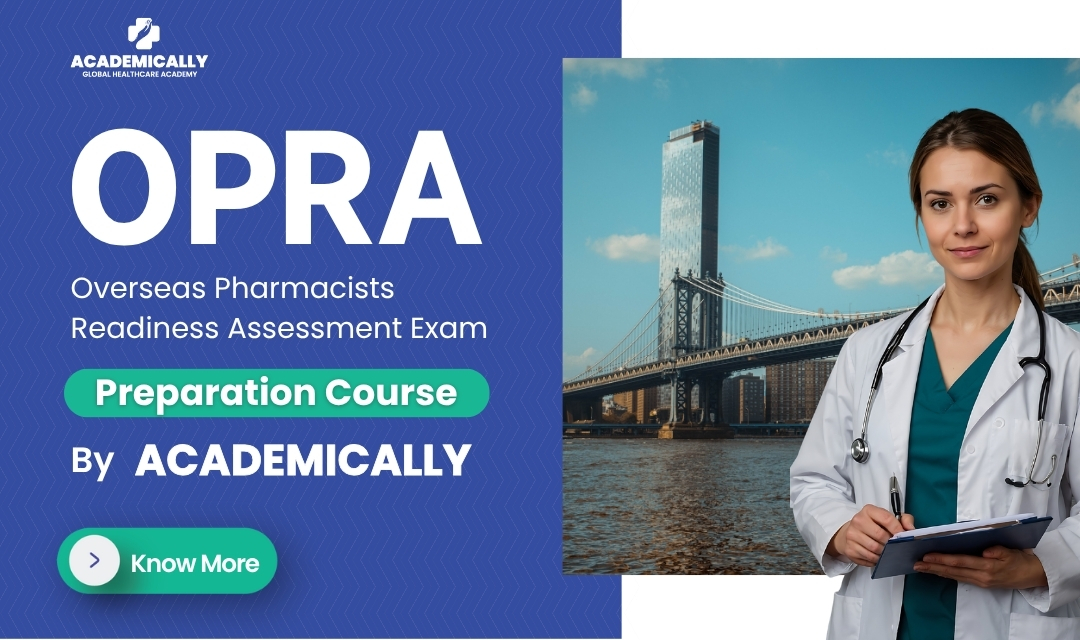If you've landed on this blog, you are probably someone who is pursuing a career in pharmacy or has recently graduated. A question that comes into your mind multiple times is “Which career path should I choose?”
We recognize that there are multiple options, which can create confusion. You may think that you should pursue clinical work, delve into research, or explore the pharmaceutical industry. What about salaries, growth opportunities, or even working abroad
In this blog, we’ll be exploring the top 7 pharmacy career options, their roles and responsibilities, and more. It will help you decide which path is best for you and help you make an informed decision.
1. Hospital Pharmacist
One of the most common career paths is that of a hospital pharmacist. They work in the hospital pharmacy. They manage the storage, dispensing and handling of the medication. They will also ensure that there are no medication errors in the prescription and during dispensing.
As hospitals become larger and healthcare systems become more complex. There is a need for pharmacists. Those who can manage medicines, avoid errors, and support clinical teams is growing day by day. Hospital pharmacists play a vital role in ensuring the smooth operation of hospitals and maintaining patient safety.
Skills Required:
- Strong knowledge of medicines and hospital protocols
- Teamwork and communication skills
- Ability to manage inventory and avoid medication errors
2. Industrial Pharmacist
There is an increasing demand for medication all around the world. Whenever a medication is manufactured, it goes through a process that includes testing, production, and quality control. All of this is done to ensure that the medication's efficacy is at its best. To make sure all of this is occurring efficiently. This is where the role of an Industrial pharmacist comes into play. They ensure, from the formulation of the drug to the quality check, that everything is running smoothly.
Skills Required:
- You should possess a solid understanding of Good Manufacturing Practices (GMP) and relevant regulatory standards
- Strong analytical and technical abilities are required
- Project and production management
3. Community Pharmacist
A community pharmacist is also known as a retail pharmacist. They are the healthcare professionals you meet at your local pharmacies and drugstores. Their job is to dispense, store, and handle the medication. They are usually the first point of contact for basic health concerns. They can also hand over the OTC products. They guide the patient or counsel them on how to take their medication and address their basic queries regarding it.
Skills Required:
- Excellent communication and patient interaction
- Strong knowledge of medications and their uses
- Basic business and inventory management
4. Pharmacovigilance
Many pharmacy graduates choose a career in pharmacovigilance. Pharmacovigilance is related to drug safety. It is about monitoring, detecting, and assessing adverse drug reactions (ADRs). The primary goal is to ensure that the medicines remain safe and effective for patients.
Pharmacovigilance has become increasingly important in recent years due to stricter global regulations and the rapid introduction of new medicines. People working in this field help keep patients safe by ensuring that drugs are safe for use. They usually work with pharmaceutical companies, research organizations, or government agencies to collect data, review patient reports, and provide updates on drug safety.
Skills Required
- Strong knowledge of pharmacology and clinical research
- Analytical and reporting skills
- Attention to detail and the ability to spot safety concerns
- Understanding of regulatory guidelines (FDA, EMA, etc.)
5. Regulatory Affairs
Regulatory affairs is a growing career in the pharmaceutical industry. Professionals in this field ensure that medicines comply with all relevant rules and regulations before they can be sold. They prepare documents, work with government authorities, and guide companies through the approval process for new drugs.
As pharmaceutical companies expand globally, regulatory affairs experts are in high demand. They help companies avoid delays, comply with regulations, and ensure that products are safe and approved for use by patients.
Skills Required:
6. Clinical Research Coordinator (CRC)
A CRC is responsible for monitoring clinical trials to ensure they adhere to proper protocols, ethical standards, and regulatory requirements. They work closely with pharmaceutical companies, hospitals, and clinical research organizations to ensure that new medicines are tested safely and effectively.
The demand for CRCs has grown rapidly as more clinical trials, vaccines, and innovative therapies are being developed worldwide. They play a vital role in bringing new treatments to patients while maintaining safety and quality standards.
Skills Required:
- Knowledge of clinical trial protocols and Good Clinical Practice (GCP)
- Strong analytical and organizational skills
- Attention to detail and regulatory compliance
7. Clinical Pharmacist
Clinical pharmacists work directly with doctors, nurses, and patients to ensure medicines are used safely and effectively. They review prescriptions, monitor patient responses, and provide counseling for those managing chronic or complex medical conditions.
As healthcare moves toward personalized treatment and patient safety, clinical pharmacists play a crucial role in reducing medication errors and enhancing treatment outcomes.
Skills Required:
- Strong clinical knowledge
- Patient counseling and communication skills
- Critical thinking and problem-solving
To work as a clinical pharmacist internationally, you typically need a Pharm. D. or M.Pharm in Clinical Pharmacy, along with hospital-based training. A B.Pharm alone is often not enough, though it can help you start in hospital pharmacy roles and later upgrade your qualifications.
What Pharmacy Graduates Should Know in 2025?
- Diversification is Key: Pharmacy is no longer limited to dispensing medications. Opportunities span clinical practice, research, industry, and regulatory sectors.
- Global Demand: Countries such as the USA, Canada, the UAE, Australia, and the UK offer lucrative salaries and career growth opportunities for qualified pharmacists.
- Upskilling Pays Off: Certifications, advanced degrees, and specialized training significantly enhance your prospects and earning potential.
- Adaptability Matters: With technology, digital healthcare, and biotechnology advancing rapidly, staying updated with industry trends is crucial.
Want to be a Registered Pharmacist Abroad?
To become a licensed pharmacist abroad, having a pharmacy degree alone is not sufficient. Most countries require you to clear specific licensing exams before you can practice. For example, Australia requires you to qualify the OPRA exam, the USA requires the NAPLEX, Canada has the PEBC, and the UK follows the GPhC registration process after you have completed your OSPAP course. These exams test your knowledge of pharmacy practice, clinical skills, and regulations, ensuring that you meet the standards of the country you plan to work in. Preparing for and clearing these exams is a crucial step for building a global pharmacy career.
Pharmacy is a field of endless possibilities. Whether your interest lies in clinical care, research, industry, or regulation, there is a rewarding career path waiting for you. The right combination of education, skills, and experience can lead to global opportunities and impressive earnings.
If you are a pharmacy graduate or student planning your career, explore these top 7 pharmacy careers, assess your strengths, and choose the path that aligns with your goals. With dedication and strategic planning, 2025 can be your year to excel in the pharmacy profession.

What Pharmacy Graduates Should Know in 2025
- Diversification is Key: Pharmacy is no longer limited to dispensing medications. Opportunities span clinical practice, research, industry, and regulatory sectors.
- Global Demand: Countries such as the USA, Canada, the UAE, Australia, and the UK offer lucrative salaries and career growth opportunities for qualified pharmacists.
- Upskilling Pays Off: Certifications, advanced degrees, and specialized training significantly enhance your prospects and earning potential.
- Adaptability Matters: With technology, digital healthcare, and biotechnology advancing rapidly, staying updated with industry trends is crucial.
Pharmacy is a field of endless possibilities. Whether your interest lies in clinical care, research, industry, or regulation, there is a rewarding career path waiting for you. The right combination of education, skills, and experience can lead to global opportunities and impressive earnings.
If you are a pharmacy graduate or student planning your career, explore these top 7 pharmacy careers, assess your strengths, and choose the path that aligns with your goals. With dedication and strategic planning, 2025 can be your year to excel in the pharmacy profession.





